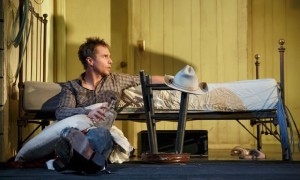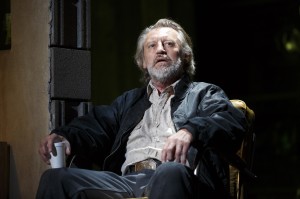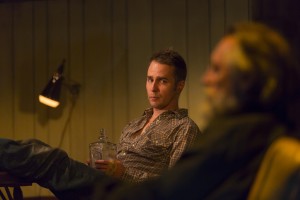Lassoing the Bedposts in FOOL FOR LOVE
You watch the stuntman Eddie in his cowboy duds lassoing the bedposts in the motel room on the edge of the Mojave Desert. And you can go big picture or little picture. Big picture is Eddie’s indoor rodeo for his half-sister May is symbolic of the closing of the Great American West, a cowboy trapped in the Cracker Jacks box of modern life . . . Little picture, you agree with May: he’s just showing off, the way a boy tries to impress a girl. He’s a fool for love.
After all it’s “Eddie.” Not Ed or Edward.
Sam Rockwell brings a menacing yet boyish charm to the role in the current Broadway production of FOOL FOR LOVE. He told the New York Times that to prepare for the role he went to rodeos, hung out with wranglers, and studied roping. He practiced by lassoing trashcans in Tompkins Square Park. To steady his throws, he does a half hour of throws before the curtain goes up. About what drives his character, Rockwell said:
“Ultimately, the scene is not about roping; the scene is about two cosmically entwined lovers. The character is incredibly vulnerable. He brings a shotgun, a bottle of tequila—all this macho swagger, to cover up that fact that he’s afraid of being abandoned. And that’s what the play is about.”
As the play moves forward, the cowboy routine seems more and more the role-playing of a little kid. Eddie tells May he’s practicing. But more than practicing, it’s avoidance: the arrested development by a man traumatized by the sad end of his mother.
It’s the reverse of a child feigning at a glorious Tom Mix adulthood. It’s the traumatized adult pretending to be that child again. Eddie is so terrified of becoming his father, the source of the family tragedy, that he can’t put away the cowboy fantasy.
His Face and Her Neck
Early in FOOL FOR LOVE, Eddie tells May he’s driven 2,480 miles to come see her and an odd–even for them–exchange follows. The stage directions instruct that Eddie is looking down as he speaks and sticking close to the wall.
EDDIE: I missed you. I did. I missed you more than anything I ever missed in my whole life. I kept thinkin’ about you the whole time I was driving. Kept seeing you. Sometimes just a part of you.
MAY: Which part?
EDDIE: Your neck.
MAY: My neck.
EDDIE: I missed all of you but your neck kept coming up for some reason. I kept crying about your neck.
MAY: Crying?
EDDIE: Yeah. Weeping. Like a little baby. Uncontrollable. It would just start up and stop and then start up all over again. For miles. I couldn’t stop it. Cars would pass me on the road. People would stare at me. My face was all twisted up. I couldn’t stop my face.
Here Eddie admits to missing May in a primal way, like a balling infant picked up and held, his face to his mother’s neck. A grown-up cowboy wouldn’t lose control of his face from missing a woman, or, at least, wouldn’t admit to it. This is the charm of Eddie, his crying game, the kid half-brother showing his vulnerability. This is Eddie’s all-out need for her as he tries to win May over one more time.
FOOL FOR LOVE’s The Old Man
Their father, The Old Man, who is both there and not there, counters Eddie’s story of uncontrollably crying with a story of his own. It’s later in the play, after Eddie has stormed out of the room. The Old Man’s story of tears and holding onto May is one of numerous father-son parallels.
The Old Man reminisces with May about how she wouldn’t stop crying when she was a girl. They (he, May’s mother, and May) were driving through Southern Utah in an old Plymouth when May wakes up from a nightmare and won’t stop crying. Her mother crawls into the backseat to try to settle her down. “But you wouldn’t shut up for hell or high water.” He describes carrying her out into a field, into absolute darkness, where they are surrounded by something moving that is bigger than the two of them put together. “And then it started to get joined up by some other things just like it. Same shape and everything.”
It turns out they were standing in the midst of a herd of cattle and it took this transformation of something unknown and terrifying in the dark to something familiar and comfortable to silence young May. This intimate father-daughter story demonstrates the incredible charm of The Old Man. It offers a positive layer to the character and makes him believable as a man who could inspire desperate love in two women, someone capable of juggling dual families.
For much of his work Shepard drew from his tense relationship with his alcoholic, violent father. In addition to FOOL FOR LOVE, the presence of The Old Man factors into True West, Curse of the Starving Class, Buried Child, and a Lie of the Mind.
Shepard admits in an interview with The Guardian that Eddie is bedeviled by the possibility of becoming his father. For the author this Oedipal problem went from being a fear to becoming a reality. “You think about it, you talk about it, analyze it, and then all of a sudden you have become the thing that you were most vehement against. It’s very Greek. They invented this shit. Or at least gave it a name.”
One of the most impressive aspects of the play is how Eddie and The Old Man mirror one another. They bounce off one another as fantasists early on [see my first Shepard post on FOOL FOR LOVE], they both offer crying stories to May, and they watch each other from a safe distance.
The Story in FOOL FOR LOVE
After Eddie explains to May’s movie date, Martin (Tom Pelphrey), that she isn’t his cousin or his wife–she’s his sister, the stage directions state: “he and THE OLD MAN look at each other, then he turns back to MARTIN.” The understated look on Eddie’s face as he peers at his father, captured in the production photo, is one of fear and fascination, of feeling sucked into the maelstrom of his dark ancestry.
Eddie explains that his father fell in love twice. For Eddie’s ears only, The Old Man corrects his son. “It was the same love. Just got split in two. That’s all.” He makes it sound like something natural observed under a microscope, a protozoa dividing.
Then Eddie goes into his side of the story and describes accompanying his father on an all-night walk. The story has a mythic feel, with white owls swooping down in the dark for jackrabbits. The language is gorgeously plain. He describes seeing a drive-in movie in the distance as:
“Just square patches of color shifting. Then vague faces began to appear. And, as we got closer, I could recognize one of the faces. It was Spencer Tracy. Spencer Tracy moving his mouth. Speaking without words. Speaking to a woman in a red dress.”
Of all the film stars for Eddie to see on the horizon, Spencer Tracy, if you know his history, is an apt choice.
They come to a liquor store, and Eddie remembers feeling jealous of the Mexican migrant workers by a pickup truck, them laughing outside the store. He remembers seeing the old man through the glass door of the liquor store. As he watches him pay for the bottle, he feels sorry for him and doesn’t know why. Maybe pity is his way of keeping them separated, viewing him always on the other side of glass.
They keep walking and pass the bottle back and forth until it’s gone. Eventually they reach the house where May and her mother live. May emerges from the bathroom just as her teenage self is introduced in Eddie’s story. Eddie tells of their first meeting, “But the second we saw each other, that very second, we knew we’d never stop being in love.”
May slams the bathroom door behind her. “Boy, you really are incredible! You’re unbelievable! Martin comes over here. He doesn’t know you from Adam and you start telling him a story like that. Are you crazy?”
Interesting that she brings up “Adam.” There are parallels between Eddie and May with Adam and Eve. They are siblings and lovers. They originate from the same father, someone who is both there and not there for them in the play, in their personal histories. Only they can see him, some derelict god situated on the border of their lives.
Gordon Joseph Weiss builds a perfectly layered portrait of The Old Man, showing all the charm and nastiness this elusive character brings to the stage. As May concludes her story, The Old Man shouts for Eddie to intercede on her take. “Just a goddam second here. This story doesn’t hold water.”
Shepard’s Father
There’s a story Sam tells about the only time his difficult father ever came to one of his plays. It was for a performance of Buried Child, one of the plays based on his family, at the Greer Garson Theater in New Mexico. Shepard wasn’t there but heard that his father was “pickled” and started interacting with the actors during the performance. (Sounds like meta-theatre at its finest.) He couldn’t hold still and stood up and said, “What a bunch of shit this is!” It was life coming back at art, fact and fiction going at it. He was asked to leave, then allowed to stay once the ushers figured out he was the father of the playwright.
For the rest of that performance, he must have been both there and not there in the play, perhaps interjecting when merely listening couldn’t satisfy him, like The Old Man in FOOL FOR LOVE. In the Paris Review interview Shepard talks of his father, of the old man’s demise.
No, a couple of years ago he was killed coming out of a bar in New Mexico. I saw him the year before he died. Our last meeting slipped into this gear where I knew it was going to turn really nasty. I remember forcing myself, for some reason, not to flip out. I don’t know why I made that decision, but I ended up leaving without coming back at him. He was boozed up, very violent and crazy. After that I didn’t see him for a long time. I did try to track him down; a friend of his told me he got a haircut, a fishing license, and a bottle, and then took off for the Pecos River. That was the last I heard of him before he died. He turned up a year later in New Mexico, with some woman I guess he was running with. They had a big blowout in a bar, and he went out in the street and got run over.
Thirty-two years since it was written, now more than ever FOOL FOR LOVE is a generational play. Ed Harris who originated the role of Eddie is now old enough to play Dodge, the old man, in Buried Child. Harris will perform that role this winter, starting in February, for the New Group at the Signature Theater. And Sam Shepard, in his seventies and battling alcoholism, has moved from the young man to the old man of his plays.
Once May has put forward her side of the story, the truth, The Old Man screams for them to stay away from one another. “You two can’t come together!” He tells Eddie, “You gotta’ hold up my end a’ this deal. I got nobody now! Nobody! You can’t betray me! You gotta’ represent me now! You’re my son!”




Leave a Reply